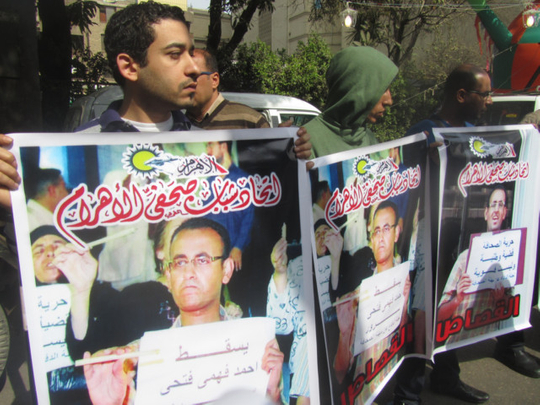
Cairo: Salem Abu Deif has been sitting in the lobby of the Egyptian Journalists Syndicate (EJS) for weeks. The simple farmer from the governorate of Sohag, 467km south of Cairo, says he has not received any answers over the death of brother Al Hussaini Abu Deif, a journalist working for the Al Fagr newspaper.
Salem believes there has been a conspiracy by the EJS to cover up his brother’s death and the deaths of several other people who have taken public stances against the government of President Mohammad Mursi.
When official forensics report finally emerged over Al Hussaini’s death, his family was not satisfied.
“The report does not coincide with reality,” Salem told Gulf News.
Al Hussaini was filming protests between supporters and opponents of Mursi on December 6, 2012 near the Presidential Palace. The official report from Salah Abdul Maqsoud, Egypt’s Minister of Information, said that Al Hussaini was standing amongst Mursi supporters when he was shot.
Abdul Maqsoud is a member of the Muslim Brotherhood and also a prominent member of EJS.
Yasser Ali, a former presidential spokesman, wrote in the Washington Post on January 16 that Al Hussaini was killed by the same bullet that killed Mursi supporters.
The official English website of the Brotherhood’s Freedom and Justice Party blamed the opposition for Al Hussaini’s death, but family and friends are convinced otherwise.
They point to the deaths of several anti-Muslim Brotherhood activists in the past few months, including Gaber Salah, Mohammad Christy, and Mohammad Al Gendi. They also accuse the head of the EJS, Mamdouh Al Wali, of complete inaction and silence over the incident.
According to witnesses and doctors who spoke to Gulf News, the accounts of that night were much different. According to Al Hussaini’s friend Mahmoud Abdul Kader, who was with him on the day, Al Hussaini was definitely targeted.
“We were standing in the middle of Khalifa Maamoun Street. I did not see who shot him but it was one shot, not the usual spurts of shooting that takes place when they are trying to disperse the crowd,” he told Gulf News.
Salem said “eyewitnesses confirmed that lasers were [trained on] Al Hussaini before he was shot.”
When Abu Deif fell to the ground, Abdul Kader and some of the protesters picked him up and carried him almost 100 metres to the nearest operational ambulance.
Mohammad Kamal, a fourth year orthopaedic medical student from Al Azhar University, and Asmaa Hassanain, a field hospital volunteer, loaded him into the ambulance around 1.30am, according to Abdul Kader. “He was bleeding profusely and his skull looked as if it was fractured, so we took him to the better-equipped Manshiet Al Bakry Hospital,” Kamal told Gulf News.
“The hospital refused to admit Abu Deif and the doctor on call told us to leave him bleeding outside,” he added. “I continued arguing with the doctor for 30 minutes while Al Hussaini kept bleeding.”
While waiting for Abu Deif to be admitted, Hassanain took out her phone to take a picture of Abu Deif.
“The hospital security tried to stop me by force, they threatened to call the police. I told them, ‘Go ahead and call them, I’m taking this picture,’” she recounted.
When it was clear that the hospital would not admit Abu Deif, Kamal and Hassanein quickly moved to take him to another hospital. But as they re-entered the ambulance it was clear that Al Hussaini, who was unconscious, was now having difficulty breathing.
“We had to intubate him and use an Ambu bag to help him breathe,” Kamal said.
Hassanein, meanwhile, was on the phone trying to find a hospital to take the dying man. The ambulance eventually went to Demerdash Hospital in Abbasseya, but they refused to admit him, stating that they had no ICU beds available.
Then they turned to Al Zahraa University Hospital, also in Abbasseya, reaching there around 2.30am.
“By that time he was in a coma and had been bleeding for over an hour,” Kamal recounted.
Initially Al Zahraa hospital also refused to admit Abu Deif, but Hassanain and Kamal were adamant that he be admitted as he was about to die.
Despite his wound being tended to and him being put on life support, it was too late. Al Hussaini succumbed to his injuries three days later.
Ayman Sharaf is an Egyptian Journalist based in Cairo












